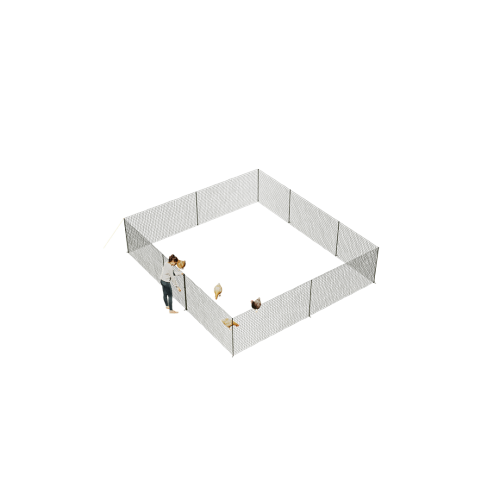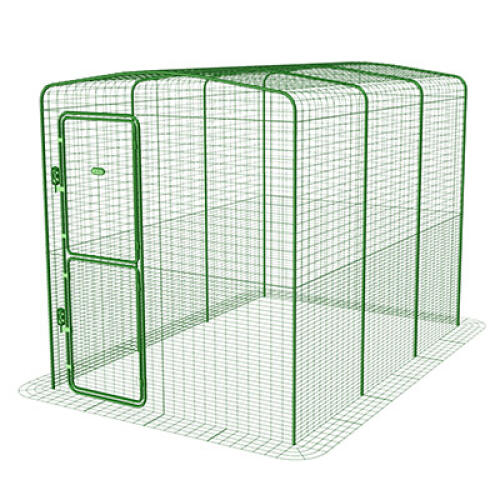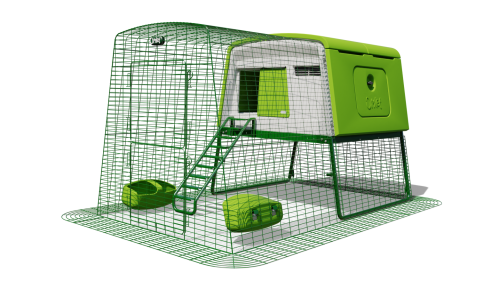As with the human cold, there are some common chicken ailments that many birds will suffer from during their lifetimes. This section details some of these potential issues. It’s worth attempting to remember these symptoms, so that if you spot them in your own birds you’ll know to take action.
Egg bound
An egg bound hen is one who has created an egg, but is unable to lay it. The egg, fully formed, will be stuck inside her, between her uterus and her cloaca. This is an important problem to be on the lookout for, because as you can imagine, it can be incredibly painful and prove fatal if not treated quickly. Symptoms of an egg bound hen include:
- A lump in, or a hard abdomen
- Refusing food and drink
- Straining
- Frequent, unproductive visits to her laying area
- A strange gait, with her vent close to the floor
- Droopiness
If you gently press her abdomen and can feel an egg in there, then you can try putting the bottom half of your hen in warm water for a few minutes. This will relax her muscles and hopefully will enable her to finally lay the egg. If this treatment isn’t successful, then you will need to take the hen to the vet as soon as possible.

The ‘pecking order’ that exists within chicken flocks can take several days to establish, and its development can be very distressing for owners to watch. Indeed, even once it’s settles down the bullying that can still take place within the group can lead to some nasty fights. If one of your birds is bleeding as the result of an attack, you may need to temporarily remove the attacker. It’s very important that you don’t remove the victim. If you do, it’s more likely that they’ll be attacked more viciously when you reunite them with their flock.
The exception to this rule is if one of your hens is bleeding. If this happens, then it’s important to take her out temporarily until she has healed. The others will peck at her wound if she’s left for long in the enclosure.
One of the key causes of excessive fighting is a lack of space. Living in cramped conditions will lead to the birds becoming stressed, and in such situations they’ll take it out on each other. Try expanding their run and providing enrichment – they could also be bored and in need of stimulation.
Coccidiosis
Coccidiosis is an intestinal problem caused by a parasitic infection. It’s an extremely painful condition that requires a prescription from a vet.
Symptoms:
- Smaller number of eggs produced
- Chicken is lethargic and drooping
- Bloody diarrhoea
- Weight loss
The parasite does considerable damage to the chicken’s gut, and it will require an anticoccidial to remove. Courses of antibiotics may also need to be administered to help the chicken deal with the damage. To prevent reinfection, you will either need to disinfect the ground that the chicken’s run is on, or move it to a new space in your backyard.
A blocked crop
A chicken’s crop is a fleshy structure at the end of their oesophagus. Since chickens don’t have teeth, they have to use slightly different methods to break up their food. You will need to check this each morning to make sure that it’s not blocked. The crop should empty overnight. If it does not, this is likely to signify an impacted or blocked crop. If your chicken appears unwell, isn’t producing healthy droppings (or any droppings at all), is refusing food and drink, or is lethargic and drooping, then you will need to act. If the blockage is minor, then encouraging your chicken to drink some warm (but not hot) water can loosen the crop. If this isn’t effective, then you will need to take your chook to the vet. Ask them to show you how to massage the chicken’s crop, as this may help you next time.

The odd soft shelled egg is normal, but if they are produced very frequently then this may indicate a problem
Chickens can sometimes produce eggs with extremely delicate or misshapen shells. They may not even be firm enough to stay intact until you see them. If you feel the shell of a broken egg, you should be able to judge whether it was a very soft, pliable shell. If this happens once in a while, then you’ve nothing to worry about, as some hens, particularly those of a hybrid variety, will lay the occasional soft shelled egg.
If this is a frequent problem, then you may need to identify the cause:
1. Insufficient calcium
The production of eggs requires a lot of calcium – the shells are more than 90% calcium, and so if your hens are lacking this nutrient, then their eggs will become thin and fragile. You can easily remedy this by ensuring that the grit you provide them with has shells in it. This should always be readily available, as chickens will only consume what they need.
If this is already available, then your hen could be getting insufficient calcium because she is filling up on nutritionally-poor foods and neglecting her pellets. Try cutting back on how many non-pellet foodstuffs you are offering your hens.
2. Stress or illness
If a hen is poorly or stressed, this can play havoc with her egg-laying abilities. If a hen is frequently laying soft shelled eggs, then give her a thorough health check, and watch how the other birds treat her.







Comments
There are no comments just yet